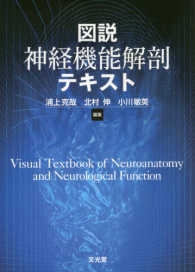- ホーム
- > 洋書
- > 英文書
- > Philosophy
Full Description
In his Rutgers Lectures, Timothy Williamson explains how contemporary philosophy suffers from a widespread pathology known as overfitting to natural and social scientists, but little understood by most philosophers. Overfitting involves an insufficiently critical attitude towards data, which leads to over-complicated theories designed to fit what are in fact errors in the data. In philosophy, the data typically comprise verdicts on hypothetical or actual cases. Errors in such data can result from our reliance on heuristics, efficient cognitive shortcuts, simple to use but not fully reliable. Just as heuristics embedded in our visual system produce visual illusions, so heuristics embedded in our general cognitive systems produce philosophical paradoxes. Williamson explains the heuristics responsible for paradoxes of vagueness and identity over time, paradoxes of conditionals, paradoxes in ascribing beliefs and other mental states to others, paradoxes of truth and falsity, and paradoxes of weighing reasons and intersectionality. As a case study, Williamson shows how illusions of hyperintensionality can result from a heuristic that projects cognitively significant differences in how explanations are presented onto supposed differences in the non-linguistic world, which then form the starting point for metaphysicians' theorizing. In each case, Williamson provides independent evidence that we commonly use the heuristic, and that it sometimes leads us astray. In short, we are being suckered by our own heuristics, and the result is overfitting. Williamson also discusses how philosophers can best avoid these problems. Williamson's important diagnosis and prescription will be of interest to a wide range of philosophers.
Contents
Preface
Chapter 1. Heuristics
1.1 Counterexamples
1.2 What are heuristics?
1.3 The persistence heuristic
1.4 The suppositional heuristic for conditionals
1.5 Disquotation and heuristics for belief ascription
1.6 The weighing heuristic for reasons
1.7 Implications for philosophical methodology
Chapter 2. Overfitting and Degrees of Freedom
2.1 Error-fragility
2.2 Data fitting
2.3 Overfitting in philosophical analysis
2.4 Overfitting in semantics
2.5 Overfitting in logic
2.6 Overfitting in philosophical model-building
2.7 Summing up
Chapter 3. Case Study: Hyperintensionalism
3.1 Two revolutions?
3.2 Extensional, intensional, hyperintensional
3.3 Hyperintensional semantics: impossible worlds
3.4 Hyperintensional semantics: truthmakers
3.5 Hyperintensional semantics: Russellian propositions
3.6 The 'why?' heuristic
Chapter 4. Frege puzzles
4.1 Representational hyperintensionality
4.2 The Fregean consensus
4.3 The failure of the Fregean consensus
4.4 Frege puzzles and synonymy
4.5 Frege puzzles from the inside
4.6 The necessary a posteriori and the contingent a priori
4.7 Heuristics for belief ascription
4.8 Heuristics for knowledge ascription
4.9 Evidence
4.10 Probability
4.11 Epistemic and doxastic logic
4.12 Drawing the threads together
Chapter 5. Intensional metametaphysics
5.1 Semantic challenges to metaphysics
5.2 The coarse-grained challenge to metaphysics
5.3 Generalizing the problem
5.4 The metalinguistic strategy
5.5 Reconceiving the problem
5.6 In brief
Bibliography
Index

![フェアリータロットカード [バラエティ]](../images/goods/ar2/web/imgdata2/49110/4911050144.jpg)






